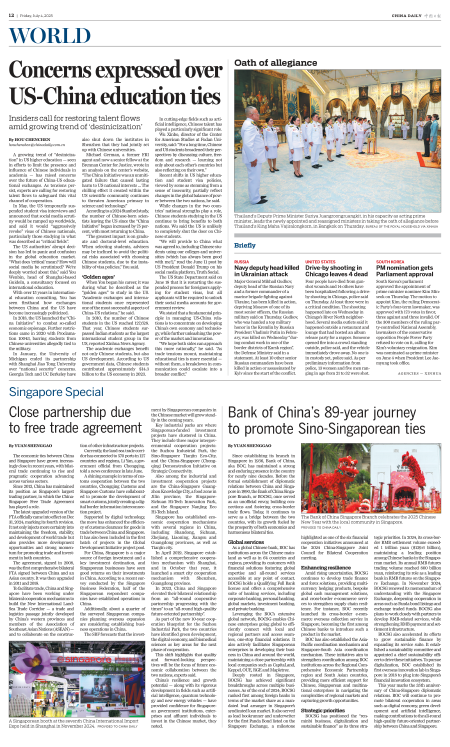
A Singaporean booth at the seventh China International Import Expo held in Shanghai in November 2024.
The economic ties between China and Singapore have grown increasingly close in recent years, with bilateral trade continuing to rise and pragmatic cooperation advancing across various sectors.
Since 2013, China has maintained its position as Singapore's largest trading partner, in which the China-Singapore Free Trade Agreement has played a role.
The latest upgraded version of the FTA officially came into effect on Dec 31, 2024, marking its fourth revision. It not only injects more certainty into maintaining the freedom, stability, and development of world trade but also provides more development opportunities and strong momentum for promoting trade and investment in both countries.
The agreement, signed in 2008, was the first comprehensive bilateral FTA signed between China and an Asian country. It was then upgraded in 2011 and 2018.
To facilitate trade, China and Singapore have been working under bilateral cooperation mechanisms to build the New International Land-Sea Trade Corridor — a trade and logistics passage jointly developed by China's western provinces and members of the Association of Southeast Asian Nations (ASEAN) — and to collaborate on the construction of other infrastructure projects.
Currently, the land-sea trade corridor has connected to 570 ports in 127 countries and regions, Li Yan, a government official from Chongqing, told a news conference in late June.
A shining example in terms of customs cooperation between the two countries, Chongqing Customs and Singapore Customs have collaborated to promote the development of smart customs, jointly creating a digital border information interconnection project.
Supported by digital technology, the move has enhanced the efficiency of customs clearance for goods in trade between China and Singapore. It has also been included in the first batch of projects in the Global Development Initiative project pool.
For China, Singapore is a major source of foreign investment and a key investment destination, and Singaporean businesses have seen good returns on their investments in China. According to a recent survey conducted by the Singapore Business Federation, half of the Singaporean respondent companies have established operations in China.
Additionally, about a quarter of the surveyed Singaporean companies planning overseas expansion are considering establishing business operations in China.
The SBF forecasts that the investment by Singaporean companies in the Chinese market will grow steadily in the coming years.
Key industrial parks are where Singaporean-funded investment projects have clustered in China. They include three major intergovernmental cooperation projects: the Suzhou Industrial Park, the Sino-Singapore Tianjin Eco-City, and the China-Singapore (Chongqing) Demonstration Initiative on Strategic Connectivity.
Also among the industrial and investment cooperation projects are the China-Singapore Guangzhou Knowledge City, a food zone in Jilin province, the Singapore-Sichuan Hi-Tech Innovation Park, and the Singapore Nanjing Eco Hi-Tech Island.
Singapore has established economic cooperation mechanisms with several regions in China, including Shandong, Sichuan, Zhejiang, Liaoning, Jiangsu and Guangdong provinces, as well as Tianjin city.
In April 2019, Singapore established a comprehensive cooperation mechanism with Shanghai, and in October that year, it launched a smart city cooperation mechanism with Shenzhen, Guangdong province.
In 2023, China and Singapore elevated their bilateral relationship from an "all-round cooperative partnership progressing with the times" to an "all-round high-quality future-oriented partnership".
As part of the new 10-year cooperation blueprint for the Suzhou Industrial Park, the two countries have identified green development, the digital economy, and biomedical sciences as key areas for the next phase of cooperation.
This shift highlights that quality and forward-looking perspectives will be the focus of future economic collaboration between the two nations, experts said.
China's resilience and growth potential — along with its vigorous development in fields such as artificial intelligence, quantum technology and new energy vehicles — have provided confidence for Singaporean government institutions, enterprises and affluent individuals to invest in the Chinese market, they noted.

